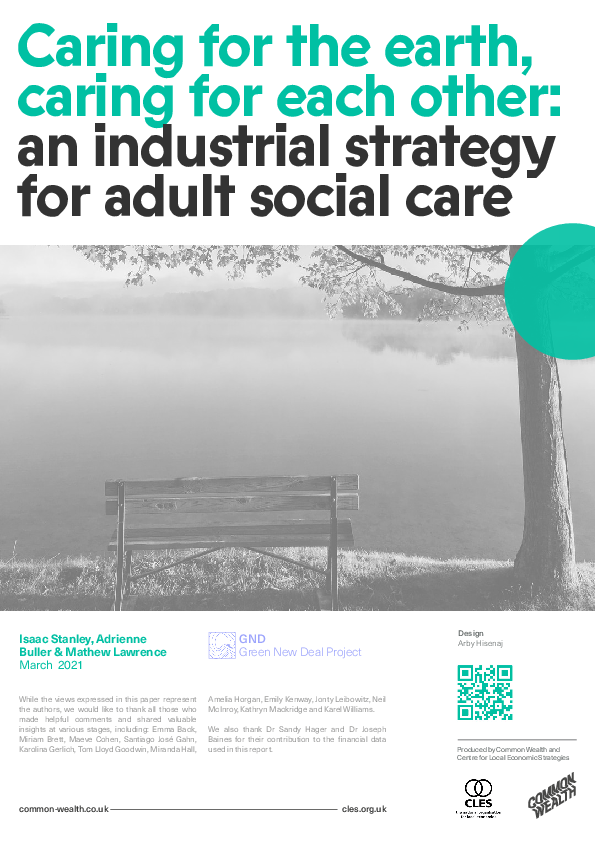Caring for the earth, caring for each other
Posted on 21 Apr 2021 Categories: Blog, Climate crisis, Cross-posts, New economic models, Caring economy
by Isaac Stanley
 During the peak of the first lockdown, people gathered on their doorsteps to clap for carers. Now it’s time to truly recognise their value.
During the peak of the first lockdown, people gathered on their doorsteps to clap for carers. Now it’s time to truly recognise their value.
The inadequacies of England’s current adult social care system have been harrowingly exposed by Covid-19. However, the origins of the present crisis long precede the pandemic. For too long, caring and nurturing work, predominantly performed by women, has been devalued. Caring for the earth, caring for each other: a radical industrial strategy for adult social care, a new joint report from CLES and Common Wealth, argues that care work should be valued and invested in as green work, and calls for a people-centred industrial strategy for adult social care.
“the care system should be at the heart of the plan for a just and green recovery”
The devaluation of care work has been accelerated by privatisation and commercialisation, which has driven a race to the bottom in care worker pay and conditions and a deterioration in care quality. Reimagining the care system should be at the heart of the plan for a just and green recovery from Covid-19. In designing the more just and sustainable decarbonised economy of the future, care must be recognised as a service vital for our collective wellbeing: one that needs to be substantially expanded and better valued.
Economic policy debates have started to pay attention to adult social care. However, they tend to approach it narrowly through the lens of raising productivity. There are a number of fundamental issues with this approach. It neglects the human dimension of care, where increasing productivity would lead to a deterioration in quality, and it fails to acknowledge care as a service that secures wellbeing, rather than simply a contributor to GDP.
“from a sector dominated by for-profit provision to one that puts the needs of people first”
Caring for the earth, caring for each other proposes an alternative strategy: to bring about a transition from a sector dominated by for-profit provision to one that puts the needs of people first. Such a strategy would not narrowly target the private sector, but would rather focus on increasing and strengthening public provision, as well as innovative forms of co-operative, voluntary and community delivery. Anchoring this transition, we believe that the public sector must return to its historic role, delivering the majority of adult social care.
Rather than being narrowly directed towards raising productivity, a people-centred industrial strategy would aim to increase the social value of adult social care, in a broad sense. This would require developing care services that meet the full needs of care-receivers, rather than treating them as maintenance problems. It would also require ensuring a Real Living Wage for care workers, as well as dignity, fulfilment and opportunities for creativity in work. To achieve this, the report offers a strategy for a radical overhaul of adult social care in England over the next decade. This is set out in 15 key recommendations, including:
- A new funding settlement for adult social care, (including free personal care for over 65s), based on progressive taxation.
- A full transition to public, co-operative, non-profit and community forms of provision by 2030.
- Immediate measures to address financial mismanagement and improve transparency in the sector.
- A robust national system of “social licensing” regulation for all care providers, requiring a Real Living Wage for all care workers.
- A new national innovation mission directed towards dignity in adult social care, built around a major fund to support diverse new models of provision and local experimentation, to be devolved to local authority level.
- A significant increase in resources allocated to Skills for Care, and investment in new forms of continuous training.
- A new system of sectoral collective bargaining for adult social care in England.
- A new statutory requirement to decarbonise the sector by 2030, backed by a new decarbonising care fund.
- A properly funded state system to provide social and emotional support services for informal carers in all parts of the country.
- A full package of measures to promote a fair gender distribution of unpaid care, including reduced working time, improving workers’ rights and access to flexible working, and wider actions to tackle gender inequalities and imbalances in the labour market.
You can read the full report by Isaac Stanley, Adrienne Buller and Mat Lawrence here.
Isaac Stanley is a senior researcher at CLES. @isaacmstanley
This was originally posted on the CLES blog on 21st March 2021.
Want to keep up-to-date with more articles like this? Sign up to our newsletter.
Posted on 21 Apr 2021 Categories: Blog, Climate crisis, Cross-posts, New economic models, Caring economy
